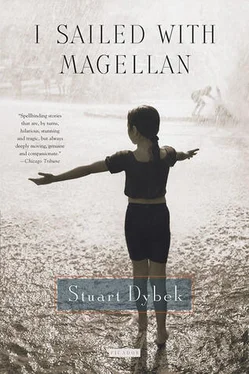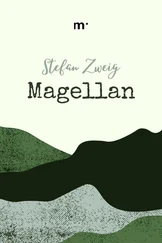“God! Gin, that’s creepy.”
“I dreamed you and I are at the beach and you bring us a couple hot dogs but forget the mustard, so you have to go all the way back to the stand for it.”
“Hot dogs, no mustard — a little too Freudian, isn’t it?”
“Honest to God, I dreamed it. You go back for mustard and I’m wondering why you’re gone so long, then a woman screams that a kid has drowned and everyone stampedes for the water. I’m swept in by the mob and forced under, and I think, This is it, I’m going to drown, but I’m able to hold my breath longer than could ever be possible. It feels like a flying dream — flying under water — and then I see this baby down there flying, too, and realize it’s the kid everyone thinks has drowned, but he’s no more drowned than I am. He looks like Cupid or one of those baby angels that cluster around the face of God.”
“Pretty weird. What do you think all the symbols mean? — hot dogs, water, drowning …”
“It means the baby who drowned inside her that night was a love child — a boy — and his soul was released there to wander through the water.”
“You don’t really believe that?”
We argued about the interpretation of dreams, about whether dreams are symbolic or psychic, prophetic or just plain nonsense, until you said, “Look, Dr. Freud, you can believe what you want about your dreams, but keep your nose out of mine, okay?”
We argued about the drowned woman, about whether her death was a suicide or a murder, about whether her appearance that night was an omen or a coincidence which, you argued, is what an omen is anyway: a coincidence that means something. By the end of summer, even if we were no longer arguing about the woman, we had acquired the habit of arguing about everything else. What was better: dogs or cats, rock or jazz, Cubs or Sox, tacos or egg rolls, right or left, night or day? — we could argue about anything.
It no longer required arguing or necking to summon the drowned woman; everywhere we went she surfaced by her own volition: at Rocky’s Italian Beef, at Lindo Mexico, at the House of Dong, our favorite Chinese restaurant, a place we still frequented because when we’d first started seeing each other they had let us sit and talk until late over tiny cups of jasmine tea and broken fortune cookies. We would always kid about going there. “Are you in the mood for Dong tonight?” I’d whisper conspiratorially. It was a dopey joke, meant for you to roll your eyes at its repeated dopiness. Back then, in winter, if one of us ordered the garlic shrimp we would both be sure to eat them so that later our mouths tasted the same when we kissed.
Even when she wasn’t mentioned, she was there with her drowned body — so dumpy next to yours — and her sad breasts, with their wrinkled nipples and sour milk — so saggy beside yours, which were still budding — with her swollen belly and her pubic bush colorless in the glare of electric light, with her tangled, slimy hair and her pouting, placid face — so lifeless beside yours — and her skin a pallid white, lightning-flash white, flashbulb white, a whiteness that couldn’t be duplicated in daylighthow I’d come to hate that pallor, so cold beside the flush of your skin.
There wasn’t a particular night when we finally broke up, just as there wasn’t a particular night when we began going together, but it was a night in fall when I guessed that it was over. We were parked in the Rambler at the dead end of the street of factories that had been our lovers’ lane, listening to a drizzle of rain and dry leaves sprinkle the hood. As always, rain revitalized the smells of smoked fish and kielbasa in the upholstery. The radio was on too low to hear, the windshield wipers swished at intervals as if we were driving, and the windows were steamed as if we’d been making out. But we’d been arguing, as usual, this time about a woman poet who had committed suicide, whose work you were reading. We were sitting, no longer talking or touching, and I remember thinking that I didn’t want to argue with you anymore. I didn’t want to sit like this in hurt silence; I wanted to talk excitedly all night as we once had. I wanted to find some way that wasn’t corny sounding to tell you how much fun I’d had in your company, how much knowing you had meant to me, and how I had suddenly realized that I’d been so intent on becoming lovers that I’d overlooked how close we’d been as friends. I wanted you to know that. I wanted you to like me again.
“It’s sad,” I started to say, meaning that I was sorry we had reached the point of silence, but before I could continue you challenged the statement.
“What makes you so sure it’s sad?”
“What do you mean, what makes me so sure?” I asked, confused by your question.
You looked at me as if what was sad was that I would never understand. “For all either one of us knows,” you said, “death could have been her triumph!”
Maybe when it really ended was the night I felt we had just reached the beginning, that one time on the beach in the summer when our bodies rammed so desperately together that for a moment I thought we did it, and maybe in our hearts we did, although for me, then, doing it in one’s heart didn’t quite count. If it did, I supposed we’d all be Casanovas.
We rode home together on the El train that night, and I felt sick and defeated in a way I was embarrassed to mention. Our mute reflections emerged like negative exposures on the dark, greasy window of the train. Lightning branched over the city, and when the train entered the subway tunnel, the lights inside flickered as if the power was disrupted, though the train continued rocketing beneath the Loop.
When the train emerged again we were on the South Side of the city and it was pouring, a deluge as if the sky had opened to drown the innocent and guilty alike. We hurried from the El station to your house, holding the Navajo blanket over our heads until, soaked, it collapsed. In the dripping doorway of your apartment building, we said good night. You were shivering. Your bikini top showed through the thin blouse plastered to your skin. I swept the wet hair away from your face and kissed you lightly on the lips, then you turned and went inside. I stepped into the rain, and you came back out, calling after me.
“What?” I asked, feeling a surge of gladness to be summoned back into the doorway with you.
“Want an umbrella?”
I didn’t. The downpour was letting up. It felt better to walk back to the station feeling the rain rinse the sand out of my hair, off my legs, until the only places where I could still feel its grit were in the crotch of my cutoffs and each squish of my shoes. A block down the street, I passed a pair of jockey shorts lying in a puddle and realized they were mine, dropped from my back pocket as we ran to your house. I left them behind, wondering if you’d see them and recognize them the next day.
By the time I had climbed the stairs back to the El platform, the rain had stopped. Your scent still hadn’t washed from my fingers. The station — the entire city it seemed — dripped and steamed. The summer sound of crickets and nighthawks echoed from the drenched neighborhood. Alone, I could admit how sick I felt. For you, it was a night that would haunt your dreams. For me, it was another night when I waited, swollen and aching, for what I had secretly nicknamed the Blue Ball Express.
Literally lovesick, groaning inwardly with each lurch of the train and worried that I was damaged for good, I peered out at the passing yellow-lit stations, where lonely men stood posted before giant advertisements, pictures of glamorous models defaced by graffiti — the same old scrawled insults and pleas: FUCK You, EAT ME. At this late hour the world seemed given over to men without women, men waiting in abject patience for something indeterminate, the way I waited for our next times. I avoided their eyes so that they wouldn’t see the pity in mine, pity for them because I’d just been with you, your scent was still on my hands, and there seemed to be so much future ahead.
Читать дальше












